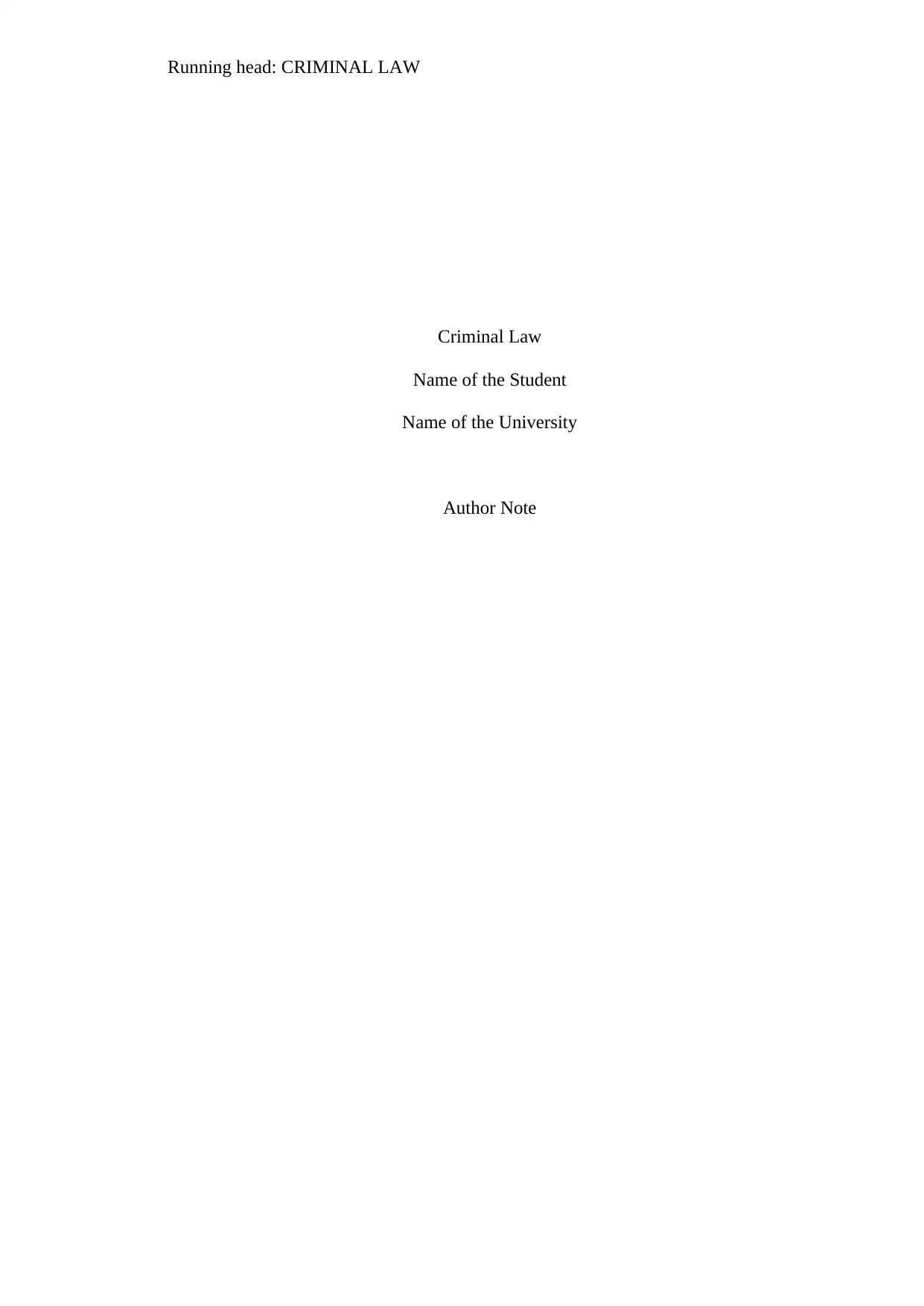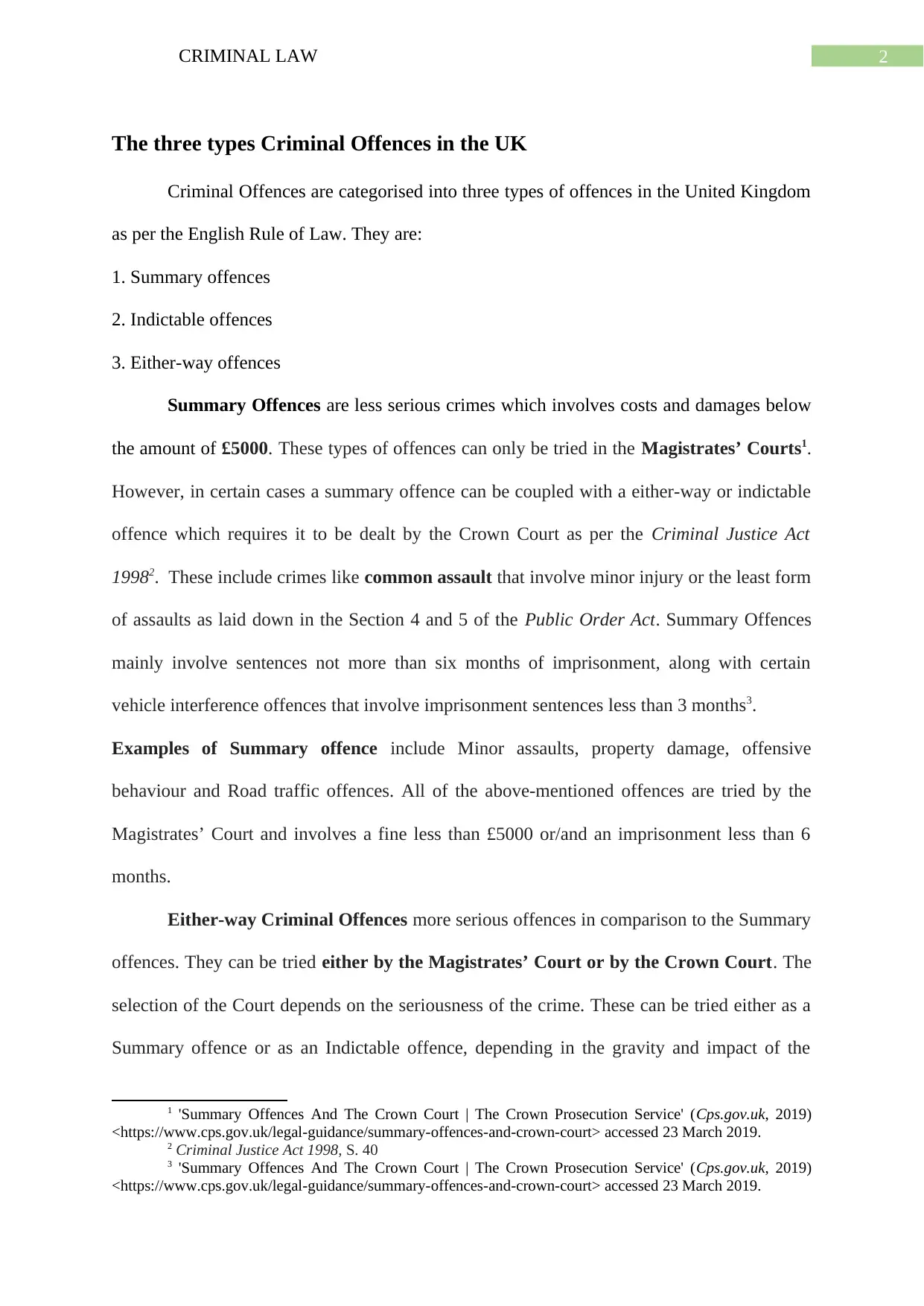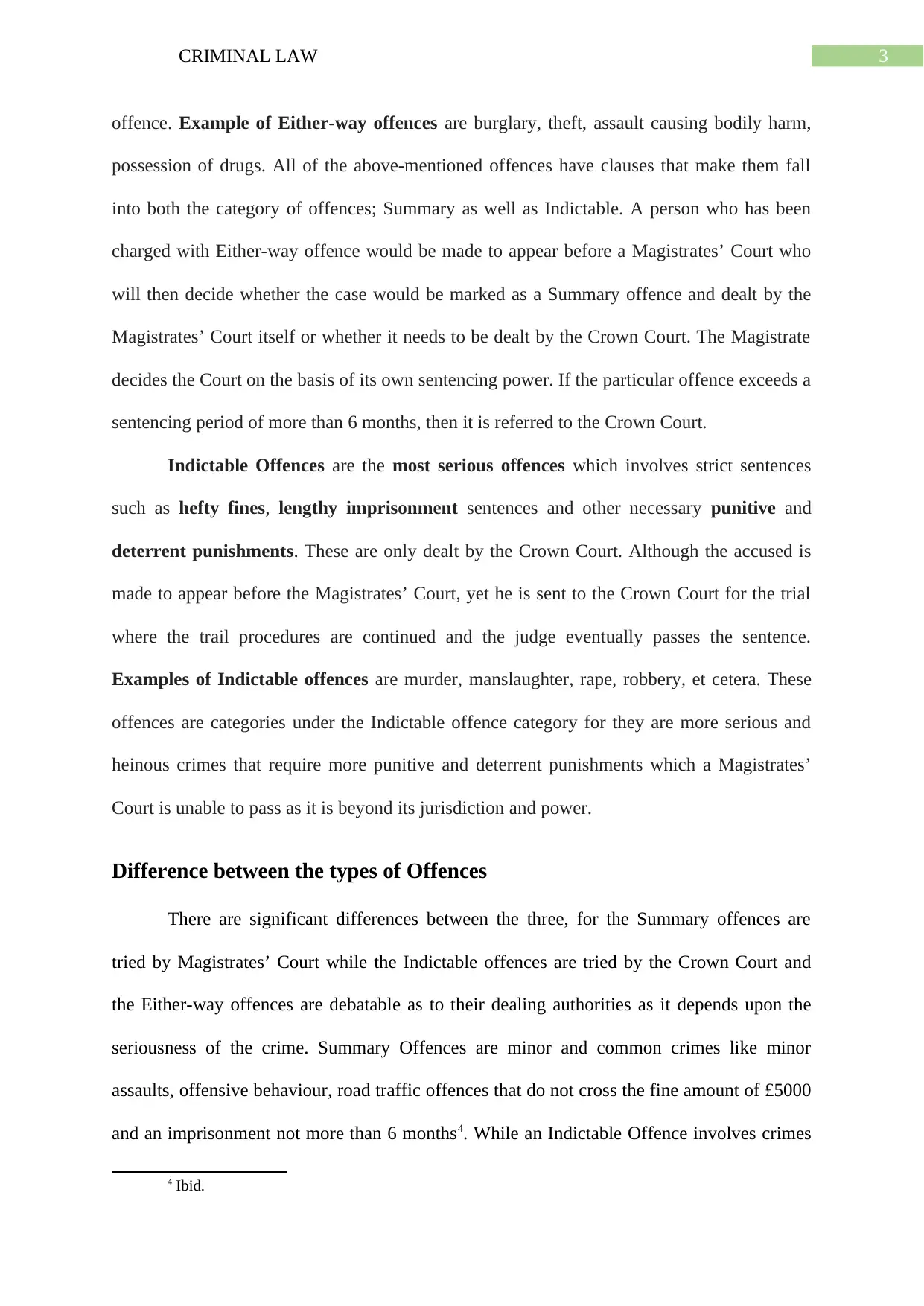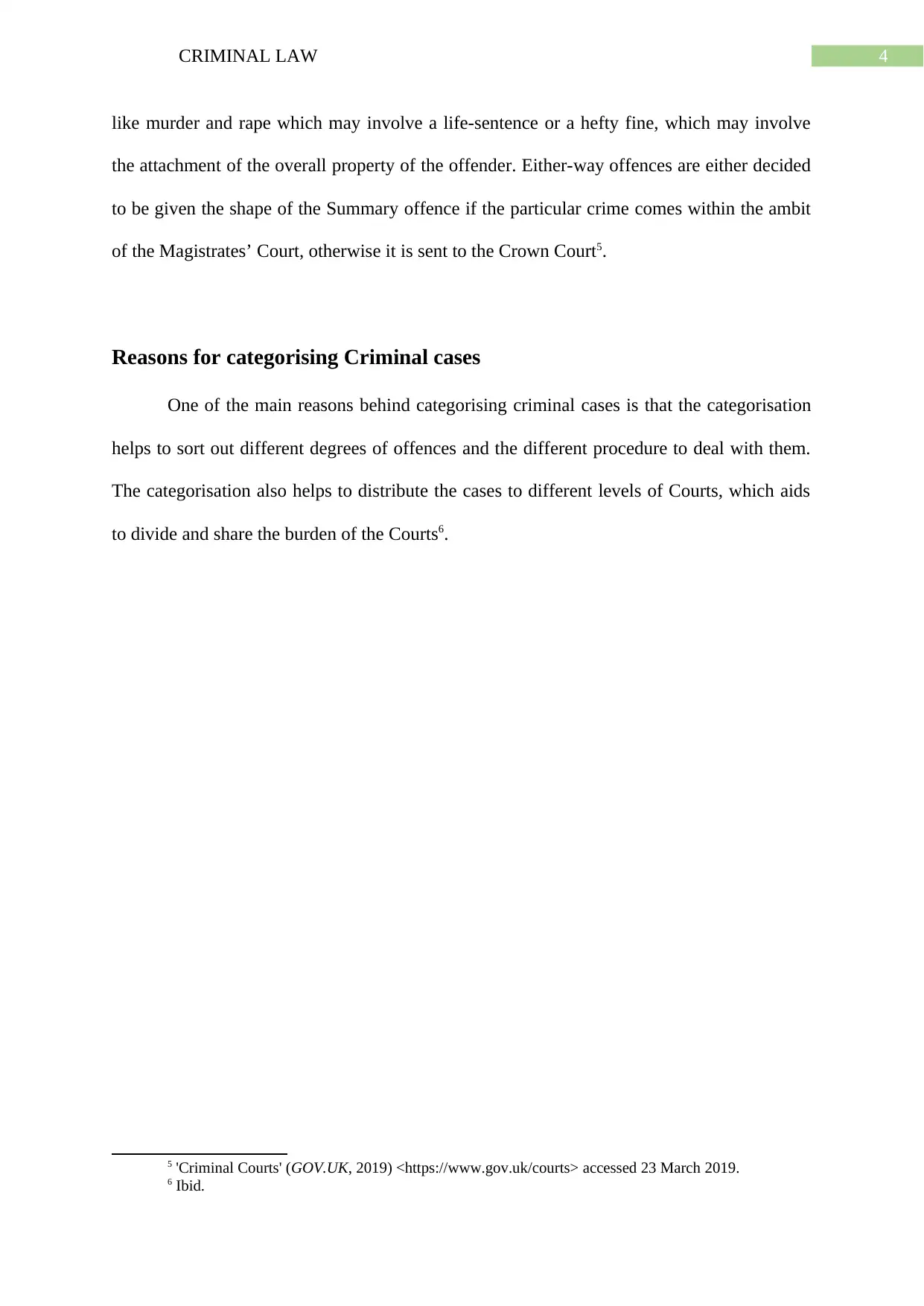Criminal Law Report: Analysis of Criminal Offences in the UK
VerifiedAdded on 2023/04/12
|6
|847
|359
Report
AI Summary
This report provides an overview of the three types of criminal offences in the United Kingdom: summary, indictable, and either-way offences. It details the key differences between these categories, including the severity of the crimes, the courts in which they are tried (Magistrates' Court or Crown Court), and the potential sentences. The report explains the criteria used to categorize offences, the roles of Actus Reus and Mens Rea, and the reasons behind the categorization of criminal cases, such as sorting different degrees of offences and distributing cases to different levels of Courts. The report also provides examples of each type of offence and the impact of each type of offence. The report is well-structured, covering the nuances of the English rule of law within the context of criminal justice. The report also explores the court procedures and sentencing for each type of offence.

Running head: CRIMINAL LAW
Criminal Law
Name of the Student
Name of the University
Author Note
Criminal Law
Name of the Student
Name of the University
Author Note
Paraphrase This Document
Need a fresh take? Get an instant paraphrase of this document with our AI Paraphraser

1CRIMINAL LAW
Table of Contents
The three types Criminal Offences in the UK................................................................2
Difference between the types of Offences.....................................................................3
Reasons for categorising Criminal cases........................................................................4
Bibliography...................................................................................................................5
Table of Contents
The three types Criminal Offences in the UK................................................................2
Difference between the types of Offences.....................................................................3
Reasons for categorising Criminal cases........................................................................4
Bibliography...................................................................................................................5

2CRIMINAL LAW
The three types Criminal Offences in the UK
Criminal Offences are categorised into three types of offences in the United Kingdom
as per the English Rule of Law. They are:
1. Summary offences
2. Indictable offences
3. Either-way offences
Summary Offences are less serious crimes which involves costs and damages below
the amount of £5000. These types of offences can only be tried in the Magistrates’ Courts1.
However, in certain cases a summary offence can be coupled with a either-way or indictable
offence which requires it to be dealt by the Crown Court as per the Criminal Justice Act
19982. These include crimes like common assault that involve minor injury or the least form
of assaults as laid down in the Section 4 and 5 of the Public Order Act. Summary Offences
mainly involve sentences not more than six months of imprisonment, along with certain
vehicle interference offences that involve imprisonment sentences less than 3 months3.
Examples of Summary offence include Minor assaults, property damage, offensive
behaviour and Road traffic offences. All of the above-mentioned offences are tried by the
Magistrates’ Court and involves a fine less than £5000 or/and an imprisonment less than 6
months.
Either-way Criminal Offences more serious offences in comparison to the Summary
offences. They can be tried either by the Magistrates’ Court or by the Crown Court. The
selection of the Court depends on the seriousness of the crime. These can be tried either as a
Summary offence or as an Indictable offence, depending in the gravity and impact of the
1 'Summary Offences And The Crown Court | The Crown Prosecution Service' (Cps.gov.uk, 2019)
<https://www.cps.gov.uk/legal-guidance/summary-offences-and-crown-court> accessed 23 March 2019.
2 Criminal Justice Act 1998, S. 40
3 'Summary Offences And The Crown Court | The Crown Prosecution Service' (Cps.gov.uk, 2019)
<https://www.cps.gov.uk/legal-guidance/summary-offences-and-crown-court> accessed 23 March 2019.
The three types Criminal Offences in the UK
Criminal Offences are categorised into three types of offences in the United Kingdom
as per the English Rule of Law. They are:
1. Summary offences
2. Indictable offences
3. Either-way offences
Summary Offences are less serious crimes which involves costs and damages below
the amount of £5000. These types of offences can only be tried in the Magistrates’ Courts1.
However, in certain cases a summary offence can be coupled with a either-way or indictable
offence which requires it to be dealt by the Crown Court as per the Criminal Justice Act
19982. These include crimes like common assault that involve minor injury or the least form
of assaults as laid down in the Section 4 and 5 of the Public Order Act. Summary Offences
mainly involve sentences not more than six months of imprisonment, along with certain
vehicle interference offences that involve imprisonment sentences less than 3 months3.
Examples of Summary offence include Minor assaults, property damage, offensive
behaviour and Road traffic offences. All of the above-mentioned offences are tried by the
Magistrates’ Court and involves a fine less than £5000 or/and an imprisonment less than 6
months.
Either-way Criminal Offences more serious offences in comparison to the Summary
offences. They can be tried either by the Magistrates’ Court or by the Crown Court. The
selection of the Court depends on the seriousness of the crime. These can be tried either as a
Summary offence or as an Indictable offence, depending in the gravity and impact of the
1 'Summary Offences And The Crown Court | The Crown Prosecution Service' (Cps.gov.uk, 2019)
<https://www.cps.gov.uk/legal-guidance/summary-offences-and-crown-court> accessed 23 March 2019.
2 Criminal Justice Act 1998, S. 40
3 'Summary Offences And The Crown Court | The Crown Prosecution Service' (Cps.gov.uk, 2019)
<https://www.cps.gov.uk/legal-guidance/summary-offences-and-crown-court> accessed 23 March 2019.
⊘ This is a preview!⊘
Do you want full access?
Subscribe today to unlock all pages.

Trusted by 1+ million students worldwide

3CRIMINAL LAW
offence. Example of Either-way offences are burglary, theft, assault causing bodily harm,
possession of drugs. All of the above-mentioned offences have clauses that make them fall
into both the category of offences; Summary as well as Indictable. A person who has been
charged with Either-way offence would be made to appear before a Magistrates’ Court who
will then decide whether the case would be marked as a Summary offence and dealt by the
Magistrates’ Court itself or whether it needs to be dealt by the Crown Court. The Magistrate
decides the Court on the basis of its own sentencing power. If the particular offence exceeds a
sentencing period of more than 6 months, then it is referred to the Crown Court.
Indictable Offences are the most serious offences which involves strict sentences
such as hefty fines, lengthy imprisonment sentences and other necessary punitive and
deterrent punishments. These are only dealt by the Crown Court. Although the accused is
made to appear before the Magistrates’ Court, yet he is sent to the Crown Court for the trial
where the trail procedures are continued and the judge eventually passes the sentence.
Examples of Indictable offences are murder, manslaughter, rape, robbery, et cetera. These
offences are categories under the Indictable offence category for they are more serious and
heinous crimes that require more punitive and deterrent punishments which a Magistrates’
Court is unable to pass as it is beyond its jurisdiction and power.
Difference between the types of Offences
There are significant differences between the three, for the Summary offences are
tried by Magistrates’ Court while the Indictable offences are tried by the Crown Court and
the Either-way offences are debatable as to their dealing authorities as it depends upon the
seriousness of the crime. Summary Offences are minor and common crimes like minor
assaults, offensive behaviour, road traffic offences that do not cross the fine amount of £5000
and an imprisonment not more than 6 months4. While an Indictable Offence involves crimes
4 Ibid.
offence. Example of Either-way offences are burglary, theft, assault causing bodily harm,
possession of drugs. All of the above-mentioned offences have clauses that make them fall
into both the category of offences; Summary as well as Indictable. A person who has been
charged with Either-way offence would be made to appear before a Magistrates’ Court who
will then decide whether the case would be marked as a Summary offence and dealt by the
Magistrates’ Court itself or whether it needs to be dealt by the Crown Court. The Magistrate
decides the Court on the basis of its own sentencing power. If the particular offence exceeds a
sentencing period of more than 6 months, then it is referred to the Crown Court.
Indictable Offences are the most serious offences which involves strict sentences
such as hefty fines, lengthy imprisonment sentences and other necessary punitive and
deterrent punishments. These are only dealt by the Crown Court. Although the accused is
made to appear before the Magistrates’ Court, yet he is sent to the Crown Court for the trial
where the trail procedures are continued and the judge eventually passes the sentence.
Examples of Indictable offences are murder, manslaughter, rape, robbery, et cetera. These
offences are categories under the Indictable offence category for they are more serious and
heinous crimes that require more punitive and deterrent punishments which a Magistrates’
Court is unable to pass as it is beyond its jurisdiction and power.
Difference between the types of Offences
There are significant differences between the three, for the Summary offences are
tried by Magistrates’ Court while the Indictable offences are tried by the Crown Court and
the Either-way offences are debatable as to their dealing authorities as it depends upon the
seriousness of the crime. Summary Offences are minor and common crimes like minor
assaults, offensive behaviour, road traffic offences that do not cross the fine amount of £5000
and an imprisonment not more than 6 months4. While an Indictable Offence involves crimes
4 Ibid.
Paraphrase This Document
Need a fresh take? Get an instant paraphrase of this document with our AI Paraphraser

4CRIMINAL LAW
like murder and rape which may involve a life-sentence or a hefty fine, which may involve
the attachment of the overall property of the offender. Either-way offences are either decided
to be given the shape of the Summary offence if the particular crime comes within the ambit
of the Magistrates’ Court, otherwise it is sent to the Crown Court5.
Reasons for categorising Criminal cases
One of the main reasons behind categorising criminal cases is that the categorisation
helps to sort out different degrees of offences and the different procedure to deal with them.
The categorisation also helps to distribute the cases to different levels of Courts, which aids
to divide and share the burden of the Courts6.
5 'Criminal Courts' (GOV.UK, 2019) <https://www.gov.uk/courts> accessed 23 March 2019.
6 Ibid.
like murder and rape which may involve a life-sentence or a hefty fine, which may involve
the attachment of the overall property of the offender. Either-way offences are either decided
to be given the shape of the Summary offence if the particular crime comes within the ambit
of the Magistrates’ Court, otherwise it is sent to the Crown Court5.
Reasons for categorising Criminal cases
One of the main reasons behind categorising criminal cases is that the categorisation
helps to sort out different degrees of offences and the different procedure to deal with them.
The categorisation also helps to distribute the cases to different levels of Courts, which aids
to divide and share the burden of the Courts6.
5 'Criminal Courts' (GOV.UK, 2019) <https://www.gov.uk/courts> accessed 23 March 2019.
6 Ibid.

5CRIMINAL LAW
Bibliography
Government websites
'Criminal Courts' (GOV.UK, 2019) <https://www.gov.uk/courts> accessed 23 March 2019
'Summary Offences And The Crown Court | The Crown Prosecution Service' (Cps.gov.uk,
2019) <https://www.cps.gov.uk/legal-guidance/summary-offences-and-crown-court>
accessed 23 March 2019
Bibliography
Government websites
'Criminal Courts' (GOV.UK, 2019) <https://www.gov.uk/courts> accessed 23 March 2019
'Summary Offences And The Crown Court | The Crown Prosecution Service' (Cps.gov.uk,
2019) <https://www.cps.gov.uk/legal-guidance/summary-offences-and-crown-court>
accessed 23 March 2019
⊘ This is a preview!⊘
Do you want full access?
Subscribe today to unlock all pages.

Trusted by 1+ million students worldwide
1 out of 6
Related Documents
Your All-in-One AI-Powered Toolkit for Academic Success.
+13062052269
info@desklib.com
Available 24*7 on WhatsApp / Email
![[object Object]](/_next/static/media/star-bottom.7253800d.svg)
Unlock your academic potential
Copyright © 2020–2026 A2Z Services. All Rights Reserved. Developed and managed by ZUCOL.





